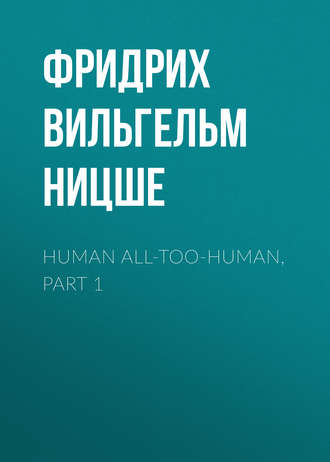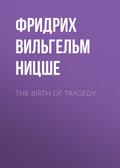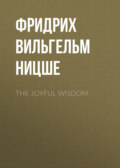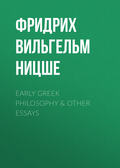
Фридрих Вильгельм Ницше
Human All-Too-Human, Part 1
19
Number. – The discovery of the laws of numbers is made upon the ground of the original, already prevailing error, that there are many similar things (but in reality there is nothing similar), at least, that there are things (but there is no "thing"). The supposition of plurality always presumes that there is something which appears frequently, – but here already error reigns, already we imagine beings, unities, which do not exist. Our sensations of space and time are false, for they lead – examined in sequence – to logical contradictions. In all scientific determinations we always reckon inevitably with certain false quantities, but as these quantities are at least constant, as, for instance, our sensation of time and space, the conclusions of science have still perfect accuracy and certainty in their connection with one another; one may continue to build upon them – until that final limit where the erroneous original suppositions, those constant faults, come into conflict with the conclusions, for instance in the doctrine of atoms. There still we always feel ourselves compelled to the acceptance of a "thing" or material "sub-stratum" that is moved, whilst the whole scientific procedure has pursued the very task of resolving everything substantial (material) into motion; here, too, we still separate with our sensation the mover and the moved and cannot get out of this circle, because the belief in things has from immemorial times been bound up with our being. When Kant says, "The understanding does not derive its laws from Nature, but dictates them to her," it is perfectly true with regard to the idea of Nature which we are compelled to associate with her (Nature = World as representation, that is to say as error), but which is the summing up of a number of errors of the understanding. The laws of numbers are entirely inapplicable to a world which is not our representation – these laws obtain only in the human world.
20
A Few Steps Back. – A degree of culture, and assuredly a very high one, is attained when man rises above superstitious and religious notions and fears, and, for instance, no longer believes in guardian angels or in original sin, and has also ceased to talk of the salvation of his soul, – if he has attained to this degree of freedom, he has still also to overcome metaphysics with the greatest exertion of his intelligence. Then, however, a retrogressive movement is necessary; he must understand the historical justification as well as the psychological in such representations, he must recognise how the greatest advancement of humanity has come therefrom, and how, without such a retrocursive movement, we should have been robbed of the best products of hitherto existing mankind. With regard to philosophical metaphysics, I always see increasing numbers who have attained to the negative goal (that all positive metaphysics is error), but as yet few who climb a few rungs backwards; one ought to look out, perhaps, over the last steps of the ladder, but not try to stand upon them. The most enlightened only succeed so far as to free themselves from metaphysics and look back upon it with superiority, while it is necessary here, too, as in the hippodrome, to turn round the end of the course.
21
Conjectural Victory of Scepticism. – For once let the sceptical starting-point be accepted, – granted that there were no other metaphysical world, and all explanations drawn from metaphysics about the only world we know were useless to us, in what light should we then look upon men and things? We can think this out for ourselves, it is useful, even though the question whether anything metaphysical has been scientifically proved by Kant and Schopenhauer were altogether set aside. For it is quite possible, according to historical probability, that some time or other man, as a general rule, may grow sceptical; the question will then be this: What form will human society take under the influence of such a mode of thought? Perhaps the scientific proof of some metaphysical world or other is already so difficult that mankind will never get rid of a certain distrust of it. And when there is distrust of metaphysics, there are on the whole the same results as if it had been directly refuted and could no longer be believed in. The historical question with regard to an unmetaphysical frame of mind in mankind remains the same in both cases.
22
Unbelief in the "monumentum Ære Perennius". – An actual drawback which accompanies the cessation of metaphysical views lies in the fact that the individual looks upon his short span of life too exclusively and receives no stronger incentives to build durable institutions intended to last for centuries, – he himself wishes to pluck the fruit from the tree which he plants, and therefore he no longer plants those trees which require regular care for centuries, and which are destined to afford shade to a long series of generations. For metaphysical views furnish the belief that in them the last conclusive foundation has been given, upon which henceforth all the future of mankind is compelled to settle down and establish itself; the individual furthers his salvation, when, for instance, he founds a church or convent, he thinks it will be reckoned to him and recompensed to him in the eternal life of the soul, it is work for the soul's eternal salvation. Can science also arouse such faith in its results? As a matter of fact, it needs doubt and distrust as its most faithful auxiliaries; nevertheless in the course of time, the sum of inviolable truths – those, namely, which have weathered all the storms of scepticism, and all destructive analysis – may have become so great (in the regimen of health, for instance), that one may determine to found thereupon "eternal" works. For the present the contrast between our excited ephemeral existence and the long-winded repose of metaphysical ages still operates too strongly, because the two ages still stand too closely together; the individual man himself now goes through too many inward and outward developments for him to venture to arrange his own lifetime permanently, and once and for all. An entirely modern man, for instance, who is going to build himself a house, has a feeling as if he were going to immure himself alive in a mausoleum.
23
The Age of Comparison. – The less men are fettered by tradition, the greater becomes the inward activity of their motives; the greater, again, in proportion thereto, the outward restlessness, the confused flux of mankind, the polyphony of strivings. For whom is there still an absolute compulsion to bind himself and his descendants to one place? For whom is there still anything strictly compulsory? As all styles of arts are imitated simultaneously, so also are all grades and kinds of morality, of customs, of cultures. Such an age obtains its importance because in it the various views of the world, customs, and cultures can be compared and experienced simultaneously, – which was formerly not possible with the always localised sway of every culture, corresponding to the rooting of all artistic styles in place and time. An increased æsthetic feeling will now at last decide amongst so many forms presenting themselves for comparison; it will allow the greater number, that is to say all those rejected by it, to die out. In the same way a selection amongst the forms and customs of the higher moralities is taking place, of which the aim can be nothing else than the downfall of the lower moralities. It is the age of comparison! That is its pride, but more justly also its grief. Let us not be afraid of this grief! Rather will we comprehend as adequately as possible the task our age sets us: posterity will bless us for doing so, – a posterity which knows itself to be as much above the terminated original national cultures as above the culture of comparison, but which looks back with gratitude on both kinds of culture as upon antiquities worthy of veneration.
24
The Possibility of Progress. – When a scholar of the ancient culture forswears the company of men who believe in progress, he does quite right. For the greatness and goodness of ancient culture lie behind it, and historical education compels one to admit that they can never be fresh again; an unbearable stupidity or an equally insufferable fanaticism would be necessary to deny this. But men can consciously resolve to develop themselves towards a new culture; whilst formerly they only developed unconsciously and by chance, they can now create better conditions for the rise of human beings, for their nourishment, education and instruction; they can administer the earth economically as a whole, and can generally weigh and restrain the powers of man. This new, conscious culture kills the old, which, regarded as a whole, has led an unconscious animal and plant life; it also kills distrust in progress, – progress is possible. I must say that it is over-hasty and almost nonsensical to believe that progress must necessarily follow; but how could one deny that it is possible? On the other hand, progress in the sense and on the path of the old culture is not even thinkable. Even if romantic fantasy has also constantly used the word "progress" to denote its aims (for instance, circumscribed primitive national cultures), it borrows the picture of it in any case from the past; its thoughts and ideas on this subject are entirely without originality.
25
Private and Œcumenical Morality. – Since the belief has ceased that a God directs in general the fate of the world and, in spite of all apparent crookedness in the path of humanity, leads it on gloriously, men themselves must set themselves œcumenical aims embracing the whole earth. The older morality, especially that of Kant, required from the individual actions which were desired from all men, – that was a delightfully naïve thing, as if each one knew off-hand what course of action was beneficial to the whole of humanity, and consequently which actions in general were desirable; it is a theory like that of free trade, taking for granted that the general harmony must result of itself according to innate laws of amelioration. Perhaps a future contemplation of the needs of humanity will show that it is by no means desirable that all men should act alike; in the interest of œcumenical aims it might rather be that for whole sections of mankind, special, and perhaps under certain circumstances even evil, tasks would have to be set. In any case, if mankind is not to destroy itself by such a conscious universal rule, there must previously be found, as a scientific standard for œcumenical aims, a knowledge of the conditions of culture superior to what has hitherto been attained. Herein lies the enormous task of the great minds of the next century.
26
Reaction As Progress. – Now and again there appear rugged, powerful, impetuous, but nevertheless backward-lagging minds which conjure up once more a past phase of mankind; they serve to prove that the new tendencies against which they are working are not yet sufficiently strong, that they still lack something, otherwise they would show better opposition to those exorcisers. Thus, for example, Luther's Reformation bears witness to the fact that in his century all the movements of the freedom of the spirit were still uncertain, tender, and youthful; science could not yet lift up its head. Indeed the whole Renaissance seems like an early spring which is almost snowed under again. But in this century also, Schopenhauer's Metaphysics showed that even now the scientific spirit is not yet strong enough; thus the whole mediæval Christian view of the world and human feeling could celebrate its resurrection in Schopenhauer's doctrine, in spite of the long achieved destruction of all Christian dogmas. There is much science in his doctrine, but it does not dominate it: it is rather the old well-known "metaphysical requirement" that does so. It is certainly one of the greatest and quite invaluable advantages which we gain from Schopenhauer, that he occasionally forces our sensations back into older, mightier modes of contemplating the world and man, to which no other path would so easily lead us. The gain to history and justice is very great, – I do not think that any one would so easily succeed now in doing justice to Christianity and its Asiatic relations without Schopenhauer's assistance, which is specially impossible from the basis of still existing Christianity. Only after this great success of justice, only after we have corrected so essential a point as the historical mode of contemplation which the age of enlightenment brought with it, may we again bear onward the banner of enlightenment, the banner with the three names, Petrarch, Erasmus, Voltaire. We have turned reaction into progress.
27
A Substitute For Religion. – It is believed that something good is said of philosophy when it is put forward as a substitute for religion for the people. As a matter of fact, in the spiritual economy there is need, at times, of an intermediary order of thought: the transition from religion to scientific contemplation is a violent, dangerous leap, which is not to be recommended. To this extent the recommendation is justifiable. But one should eventually learn that the needs which have been satisfied by religion and are now to be satisfied by philosophy are not unchangeable; these themselves can be weakened and eradicated. Think, for instance, of the Christian's distress of soul, his sighing over inward corruption, his anxiety for salvation, – all notions which originate only in errors of reason and deserve not satisfaction but destruction. A philosophy can serve either to satisfy those needs or to set them aside; for they are acquired, temporally limited needs, which are based upon suppositions contradictory to those of science. Here, in order to make a transition, art is far rather to be employed to relieve the mind overburdened with emotions; for those notions receive much less support from it than from a metaphysical philosophy. It is easier, then, to pass over from art to a really liberating philosophical science.
28
Ill-famed Words. – Away with those wearisomely hackneyed terms Optimism and Pessimism! For the occasion for using them becomes less and less from day to day; only the chatterboxes still find them so absolutely necessary. For why in all the world should any one wish to be an optimist unless he had a God to defend who must have created the best of worlds if he himself be goodness and perfection, – what thinker, however, still needs the hypothesis of a God? But every occasion for a pessimistic confession of faith is also lacking when one has no interest in being annoyed at the advocates of God (the theologians, or the theologising philosophers), and in energetically defending the opposite view, that evil reigns, that pain is greater than pleasure, that the world is a bungled piece of work, the manifestation of an ill-will to life. But who still bothers about the theologians now – except the theologians? Apart from all theology and its contentions, it is quite clear that the world is not good and not bad (to say nothing of its being the best or the worst), and that the terms "good" and "bad" have only significance with respect to man, and indeed, perhaps, they are not justified even here in the way they are usually employed; in any case we must get rid of both the calumniating and the glorifying conception of the world.
29
Intoxicated by the Scent of the Blossoms. – It is supposed that the ship of humanity has always a deeper draught, the heavier it is laden; it is believed that the deeper a man thinks, the more delicately he feels, the higher he values himself, the greater his distance from the other animals, – the more he appears as a genius amongst the animals, – all the nearer will he approach the real essence of the world and its knowledge; this he actually does too, through science, but he means to do so still more through his religions and arts. These certainly are blossoms of the world, but by no means any nearer to the root of the world than the stalk; it is not possible to understand the nature of things better through them, although almost every one believes he can. Error has made man so deep, sensitive, and inventive that he has put forth such blossoms as religions and arts. Pure knowledge could not have been capable of it. Whoever were to unveil for us the essence of the world would give us all the most disagreeable disillusionment. Not the world as thing-in-itself, but the world as representation (as error) is so full of meaning, so deep, so wonderful, bearing happiness and unhappiness in its bosom. This result leads to a philosophy of the logical denial of the world, which, however, can be combined with a practical world-affirming just as well as with its opposite.
30
Bad Habits in Reasoning. – The usual false conclusions of mankind are these: a thing exists, therefore it has a right to exist. Here there is inference from the ability to live to its suitability; from its suitability to its rightfulness. Then: an opinion brings happiness; therefore it is the true opinion. Its effect is good; therefore it is itself good and true. To the effect is here assigned the predicate beneficent, good, in the sense of the useful, and the cause is then furnished with the same predicate good, but here in the sense of the logically valid. The inversion of the sentences would read thus: an affair cannot be carried through, or maintained, therefore it is wrong; an opinion causes pain or excites, therefore it is false. The free spirit who learns only too often the faultiness of this mode of reasoning, and has to suffer from its consequences, frequently gives way to the temptation to draw the very opposite conclusions, which, in general, are naturally just as false: an affair cannot be carried through, therefore it is good; an opinion is distressing and disturbing, therefore it is true.
31
The Illogical Necessary. – One of those things that may drive a thinker into despair is the recognition of the fact that the illogical is necessary for man, and that out of the illogical comes much that is good. It is so firmly rooted in the passions, in language, in art, in religion, and generally in everything that gives value to life, that it cannot be withdrawn without thereby hopelessly injuring these beautiful things. It is only the all-too-naïve people who can believe that the nature of man can be changed into a purely logical one; but if there were degrees of proximity to this goal, how many things would not have to be lost on this course! Even the most rational man has need of nature again from time to time, i. e. his illogical fundamental attitude towards all things.
32
Injustice Necessary. – All judgments on the value of life are illogically developed, and therefore unjust. The inexactitude of the judgment lies, firstly, in the manner in which the material is presented, namely very imperfectly; secondly, in the manner in which the conclusion is formed out of it; and thirdly, in the fact that every separate element of the material is again the result of vitiated recognition, and this, too, of necessity. For instance, no experience of an individual, however near he may stand to us, can be perfect, so that we could have a logical right to make a complete estimate of him; all estimates are rash, and must be so. Finally, the standard by which we measure, our nature, is not of unalterable dimensions, – we have moods and vacillations, and yet we should have to recognise ourselves as a fixed standard in order to estimate correctly the relation of any thing whatever to ourselves. From this it will, perhaps, follow that we should make no judgments at all; if one could only live without making estimations, without having likes and dislikes! For all dislike is connected with an estimation, as well as all inclination. An impulse towards or away from anything without a feeling that something advantageous is desired, something injurious avoided, an impulse without any kind of conscious valuation of the worth of the aim does not exist in man. We are from the beginning illogical, and therefore unjust beings, and can recognise this; it is one of the greatest and most inexplicable discords of existence.
33
Error About Life Necessary For Life. – Every belief in the value and worthiness of life is based on vitiated thought; it is only possible through the fact that sympathy for the general life and suffering of mankind is very weakly developed in the individual. Even the rarer people who think outside themselves do not contemplate this general life, but only a limited part of it. If one understands how to direct one's attention chiefly to the exceptions, – I mean to the highly gifted and the rich souls, – if one regards the production of these as the aim of the whole world-development and rejoices in its operation, then one may believe in the value of life, because one thereby overlooks the other men – one consequently thinks fallaciously. So too, when one directs one's attention to all mankind, but only considers one species of impulses in them, the less egoistical ones, and excuses them with regard to the other instincts, one may then again entertain hopes of mankind in general and believe so far in the value of life, consequently in this case also through fallaciousness of thought. Let one, however, behave in this or that manner: with such behaviour one is an exception amongst men. Now, most people bear life without any considerable grumbling, and consequently believe in the value of existence, but precisely because each one is solely self-seeking and self-affirming, and does not step out of himself like those exceptions; everything extra-personal is imperceptible to them, or at most seems only a faint shadow. Therefore on this alone is based the value of life for the ordinary everyday man, that he regards himself as more important than the world. The great lack of imagination from which he suffers is the reason why he cannot enter into the feelings of other beings, and therefore sympathises as little as possible with their fate and suffering. He, on the other hand, who really could sympathise therewith, would have to despair of the value of life; were he to succeed in comprehending and feeling in himself the general consciousness of mankind, he would collapse with a curse on existence; for mankind as a whole has no goals, consequently man, in considering his whole course, cannot find in it his comfort and support, but his despair. If, in all that he does, he considers the final aimlessness of man, his own activity assumes in his eyes the character of wastefulness. But to feel one's self just as much wasted as humanity (and not only as an individual) as we see the single blossom of nature wasted, is a feeling above all other feelings. But who is capable of it? Assuredly only a poet, and poets always know how to console themselves.
34
For Tranquillity. – But does not our philosophy thus become a tragedy? Does not truth become hostile to life, to improvement? A question seems to weigh upon our tongue and yet hesitate to make itself heard: whether one can consciously remain in untruthfulness? or, supposing one were obliged to do this, would not death be preferable? For there is no longer any "must"; morality, in so far as it had any "must" or "shalt", has been destroyed by our mode of contemplation, just as religion has been destroyed. Knowledge can only allow pleasure and pain, benefit and injury to subsist as motives; but how will these motives agree with the sense of truth? They also contain errors (for, as already said, inclination and aversion, and their very incorrect determinations, practically regulate our pleasure and pain). The whole of human life is deeply immersed in untruthfulness; the individual cannot draw it up out of this well, without thereby taking a deep dislike to his whole past, without finding his present motives – those of honour, for instance – inconsistent, and without opposing scorn and disdain to the passions which conduce to happiness in the future. Is it true that there remains but one sole way of thinking which brings after it despair as a personal experience, as a theoretical result, a philosophy of dissolution, disintegration, and self-destruction? I believe that the decision with regard to the after-effects of the knowledge will be given through the temperament of a man; I could imagine another after-effect, just as well as that one described, which is possible in certain natures, by means of which a life would arise much simpler, freer from emotions than is the present one, so that though at first, indeed, the old motives of passionate desire might still have strength from old hereditary habit, they would gradually become weaker under the influence – of purifying knowledge. One would live at last amongst men, and with one's self as with Nature, without praise, reproach, or agitation, feasting one's eyes, as if it were a play, upon much of which one was formerly afraid. One would be free from the emphasis, and would no longer feel the goading, of the thought that one is not only nature or more than nature. Certainly, as already remarked, a good temperament would be necessary for this, an even, mild, and naturally joyous soul, a disposition which would not always need to be on its guard against spite and sudden outbreaks, and would not convey in its utterances anything of a grumbling or sudden nature, – those well-known vexatious qualities of old dogs and men who have been long chained up. On the contrary, a man from whom the ordinary fetters of life have so far fallen that he continues to live only for the sake of ever better knowledge must be able to renounce without envy and regret: much, indeed almost everything that is precious to other men, he must regard as the all-sufficing and the most desirable condition; the free, fearless soaring over men, customs, laws, and the traditional valuations of things. The joy of this condition he imparts willingly, and he has perhaps nothing else to impart, – wherein, to be sure, there is more privation and renunciation. If, nevertheless, more is demanded from him, he will point with a friendly shake of his head to his brother, the free man of action, and will perhaps not conceal a little derision, for as regards this "freedom" it is a very peculiar case.







